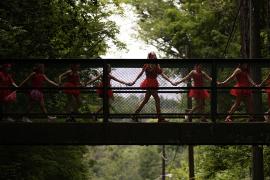What did I get myself into, or why did I come back? These unspoken questions go through the minds of many staff during the first hour of orientation. Yes, camp is an awesome place to spend the summer, but day one of orientation can be frightening, intimidating, refreshing, or even adventurous. Even though you will be in the same physical place, returning staff and new hires have very different agendas. One group is excited, crying, hugging, animated, and screaming while the other is patient, perplexed, anxious, and a little scared. In either case, look around and know you are part of a special group of people who have been chosen to model a youth development process that will change the lives of young people.
Your words, actions, and the desire to make a positive impact will now be evaluated by aspiring young children who need guidance. For some of you, this idea is a frightening concept and for others it will challenge your inner core, but in either case — C-DAY is coming. C-DAY is the day campers arrive.
C.E.R.T.
When you arrive at camp, your motivation for accepting the job may have changed. If this happens, personality changes may be seen in maturity, staff relationships, dealing with freedom, or adjusting to new living situations. To minimize this affect, learn the value of C.E.R.T., which stands for Character, Environment, Relationships, and Training.
Character
Many potential camp problems never happen when people of good character are present. Under stress, can you focus on the process? Can you always act with professionalism and consistently guide campers with the end result in mind?
Occasionally, you may be tempted to do things on your own which are counterproductive to the camp’s stated objectives. When this happens, you risk becoming selfish and irresponsible — a staff member with a personal agenda. Consequences can be immediate as other staff may form behavioral opinions about your overall potential.
So why do you sometimes act unprofessional? Contributing factors to unprofessional behavior can be age, frustration, lack of skill, maturity, environment, or any host of reasons. Undesired behavior manifests itself through actions or words that may be characterized as follows:
- Suspicious behavior; trying to get away with something.
- Doing or avoiding something for personal gain.
- Complaining, saying life is unfair or nobody cares.
- Spending time excessively daydreaming, texting, talking on the phone, or listening to an iPod®.
- Not understanding responsibility or consistently trying to blame others.
- Being asked to do things that require too much effort and then becoming belligerent because "nobody told me."
You can drastically minimize personal demonstrations of undesired behavior by learning how to think before you act. Supervisors will provide you with jobspecific guidelines that outline a step-bystep action process. The end statement in this exercise should clearly define what your desired behavior will look like once camp begins. Think for a second about what your campers are going to say about you when they go home. To do this, create some reallife camp scenarios and decide which actions will lead to positive camper impressions.
Let’s consider a creative process that may help predict your possible problem areas. When you have group and specialist meetings, ask senior staff for immediate solutions to both individual and group problems. Staff directors and trainers suggest the following to new staff to help reduce incidents of undesired, unprofessional behavior:
- Ask how to set boundaries — include questions about physical, mental, emotional, spiritual, behavioral, etc.
- Inquire about hanging out and PDA — what are the camp’s guidelines on displays of affection? Be aware of your behavior patterns and choices. Do they affect your job?
- Negotiate rules — ask to help create some noncritical rules. Design corresponding consequences.
- Be firm yet sensitive — do not waiver on difficult issues, but listen to rationale for existing behavior in others.
- Acknowledge aptitude — sometimes growth needs to be cultivated over time so look into the future and evaluate your own possible leadership potential.
- Include praise/rewards — this should be celebrated and predetermined, relating to both short- and long-term objectives.
Is it realistic to expect you will be professional every day? No. So what can parents expect? The answer is a well-trained staff member who consistently upholds good character that reflects the camp’s ideals over time. Ultimately, the goal is to exhibit good character through professional behavior where older, more experienced staff are acting as role models (see the sidebar, Seeking Role Models in Senior Staff) for new hires. Steve Covey, in his book The Seven Habits of Highly Successful People, describes habits as an intersection of knowledge, skill, and desire. "Knowledge is the theoretical paradigm, the what to do, and the why. Skill is the how to do. And desire is the motivation, the want to do."
Environment
Environmental considerations should reflect the benefits each staff member can provide on a daily basis. These differ dramatically from day to resident camp and should include noncamp-related items. In either case, the actual duties and responsibilities should be challenging but not overwhelming.
If you are new to camp and you have just come from school, home, vacation, another country, or somewhere other than camp, the idea of community living may be new to you. Your specific camp job also comes with some universal responsibilities that are nonnegotiable like: getting up early, having to go to bed when asked, sharing bathrooms, planning, using appropriate language or dress, showing up for work every day, and being responsible for a parent’s most prized possession — their child!
Relationships
Relationship building can be the most difficult part of shaping your camp experience. If you are having trouble finding a natural group of friends, discontentment can soon follow. Some helpful hints include: asking supervisors to provide ideas on how to manage stress, have daily opportunities to recognize and manage your personal emotions through administrative support, and have the ability to interject humor (not sarcasm) as an acceptable form of expressing life-long lessons. In addition, intentionally initiate staff-to-staff communication during nonprogram hours to build a sense of community and a solid foundation of personal connection.
A sense of community can be defined as "a feeling that members have of belonging, a feeling that members matter to one another and to the group, and a shared faith that members’ needs will be met through their commitment to be together." The four components formulating the "Sense of Community" theory are (McMillan and Chavis 1986):
- Membership — boundaries, emotional safety, a sense of belonging, personal investment, a common symbol system
- Influence — empower and influence
- Integration and fulfillment of needs — being desired and valued
- Shared emotional connection — contact, quality, closure
Training
Remember, training is not just something that happens to you before camp starts. It will be an ongoing part of daily camp life. If you find that you have problems — with campers, other staff, or just in managing — watch how seasoned staff handle issues and always know that you can ask for help.
If training seems long . . . tedious . . . and sometimes more of a monologue than dialogue, don’t panic!! You may mentally want to check out, but remember how you feel. It will help you when the campers arrive. Your orientation is designed to get you involved in activities as soon as possible. In her book "Sit and Get" Won’t Grow Dendrites, Marcia Tate states "brain research is confirming what staff developers have always known — learning must be linked to real-life experiences for the learner to retain and later apply what is being learned."
Simple examples of this include any fun meet/greet games, a "sing down," or camp-wide events such as solving a mystery or drawing a camp map to find a yummy treat. To understand the process, you must enthusiastically participate. Take some personal responsibility and get involved in as much of the process as you can without being overwhelmed. This is the time for you to show the leadership qualities you have. Be proactive and use precamp time to prepare yourself to lead activities. If possible, ask the camp to group you with other staff to talk about what works or does not work in terms of implementing activities.
Motivated, Dedicated, and Professional
To be part of a motivated, dedicated, and professional staff there must be trust. This necessitates that you and your supervisor create a personal relationship through daily interaction, activities, special events, or meals. One camp I visited last summer had a boy’s side program director who made it his personal mission to know all staff and 180 male campers (in the first five days) by their first name.
If you take the time to learn acceptable guidelines and understand the value of personal responsibility, you will be better prepared for C-Day. To do this, you must examine your personal beliefs and use senior staff as role models.
If you have an understanding of how to exhibit your good character through professional behaviors, how to flourish in your particular camp environment, how to foster relationship building, and how to participate and absorb whole-heartedly your camp’s specialized training, you will be an asset to the staff. So, take those gifts you have and the lessons you learn in precamp training and be proactive in your approach to leadership development. This will result in mutual trust that will empower you to be a positive role model for others to emulate.
References
Covey, S. (2004). The Seven Habits of Highly Effective People, Free Press, New York, New York.
Chavis, D.M. and McMillan, D.W. (1986). "Sense of Community: A Definition and Theory," American Journal of Community Psychology, 14(1), 6-23.
Tate, M. (2004). "Sit and Get" Won’t Grow Dendrites, Corwin Press, Thousand Oaks, California.
Wolfe, P. (2000). The brain-compatible curriculum. Educational Leadership, 58(3), 49-52.
Greg Cronin of GCTrainingSolutions is a certified camp director and consultant with over thirty years of camp experience. For information on staff trainings and workshops, please visitwww.GCTrainingSolutions.com. Contact the author at 703-395-6661 or e-mailGreg@GCTrainingSolutions.com.
Originally published in the 2009 May/June issue of Camping Magazine.




